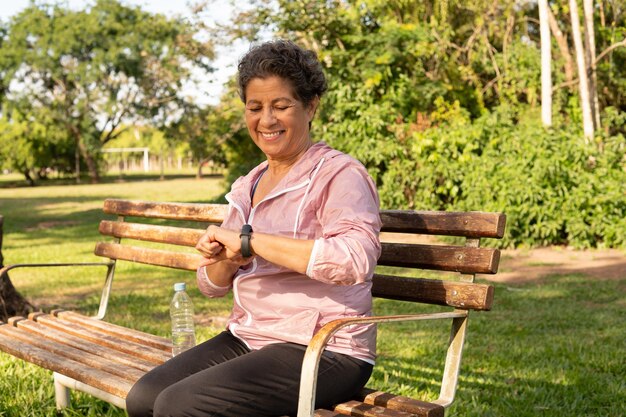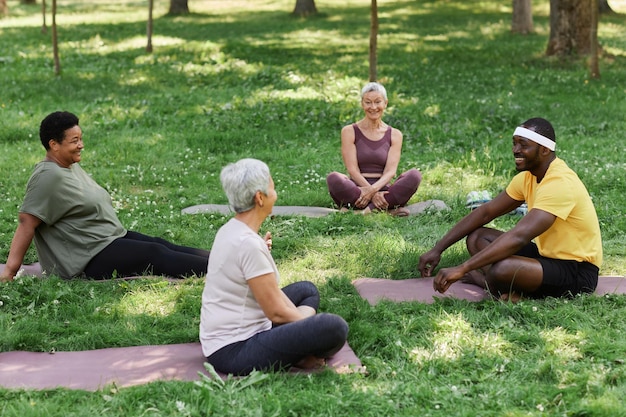Unlock Wellness: 30 Minutes Outdoors Can Lower Blood Pressure by 5%

Spending just 30 minutes outdoors daily can significantly enhance your well-being, including lowering blood pressure by 5%, reducing stress, improving mood, and boosting overall mental and physical health.
Did you know that something as simple as stepping outside for just 30 minutes each day could significantly improve your health? The benefits of nature, including a potential 5% reduction in blood pressure, are becoming increasingly recognized, making it a vital component of a mindful and healthy lifestyle.
The science behind nature’s healing power
The positive effects of nature on our well-being are not just anecdotal; they are backed by scientific research. Studies have consistently shown that exposure to natural environments can lead to measurable improvements in both physical and mental health. But how does it work?
Physiological responses to nature
Our bodies react in specific ways when exposed to nature. For instance, studies have shown that individuals who spend time in forests exhibit lower levels of cortisol, a hormone associated with stress.
The role of phytoncides
Trees and plants emit airborne chemicals called phytoncides, which have been found to boost the activity of our natural killer (NK) cells, a type of immune cell that fights off infections and cancer. This is one reason why forest bathing, or Shinrin-yoku, is a popular practice in Japan.
- Reduced blood pressure and heart rate: Spending time in nature lowers both systolic and diastolic blood pressure.
- Stress reduction: Cortisol levels drop, promoting a sense of calm.
- Improved immune function: Enhanced NK cell activity strengthens the body’s defenses.
- Enhanced mood: Exposure to sunlight boosts serotonin levels, elevating mood.
Beyond the physiological effects, nature also provides a sense of peace and tranquility that can be particularly beneficial in our fast-paced, technology-driven world. The quiet beauty of a natural setting allows us to disconnect from the stresses of daily life and reconnect with ourselves.
Lowering blood pressure naturally: A 30-minute prescription
One of the most compelling benefits of spending time in nature is its ability to lower blood pressure. High blood pressure, or hypertension, is a major risk factor for heart disease, stroke, and other serious health problems. Fortunately, incorporating just 30 minutes of outdoor activity into your daily routine can have a significant impact.
How nature helps regulate blood pressure
Research indicates that exposure to natural environments can activate the parasympathetic nervous system, which is responsible for the “rest and digest” response. This, in turn, can lead to a decrease in heart rate and blood pressure.

Practical ways to incorporate nature into your day
You don’t need to embark on a wilderness expedition to reap the benefits of nature. Simple activities such as walking in a park, gardening, or even sitting under a tree can make a difference.
- Take a 30-minute walk in a nearby park or green space.
- Spend your lunch break outdoors, eating in a garden or courtyard.
- Start a small garden, even if it’s just a few potted plants on your balcony.
- Practice mindful breathing exercises in a natural setting.
Engaging with nature doesn’t require strenuous effort or significant time commitment. By making small changes to your daily routine, you can harness nature’s power to lower your blood pressure and improve your overall cardiovascular health.
Boosting mental well-being: Nature’s mood enhancer
Beyond the physical benefits, spending time in nature can also have a profound impact on your mental and emotional well-being. In today’s world, where stress and anxiety are rampant, nature provides a much-needed antidote.
Reducing stress and anxiety
Studies have shown that exposure to natural environments can lower levels of cortisol, the stress hormone. This, in turn, can reduce feelings of anxiety and promote a sense of calm.
Improving mood and self-esteem
Spending time in nature has been linked to increased levels of serotonin, a neurotransmitter that plays a key role in mood regulation. Additionally, engaging with nature can boost self-esteem and promote feelings of accomplishment.

Activities to enhance mental well-being in nature
From mindful walks to nature photography, there are numerous ways to connect with nature and enhance your mental well-being. The key is to find activities that resonate with you and make you feel grounded and connected.
- Go for a mindful walk, paying attention to the sights, sounds, and smells around you.
- Practice nature photography, capturing the beauty of the natural world.
- Engage in outdoor activities such as hiking, biking, or kayaking.
- Simply sit in a park or garden, observing the natural surroundings.
Nature can be a powerful tool for improving mental and emotional well-being. By incorporating regular outdoor activities into our lives, we can reduce stress, improve our mood, and enhance our overall quality of life.
Nature and mindfulness: Cultivating presence in the moment
Mindfulness, the practice of paying attention to the present moment without judgment, is a powerful tool for enhancing well-being. When combined with nature, mindfulness can become even more profound.
Practicing mindful observation
One way to cultivate presence in nature is through mindful observation. This involves paying close attention to the details of the natural world around you, noticing the colors, shapes, textures, and sounds.
Engaging all your senses
To fully immerse yourself in the present moment, engage all your senses. Feel the texture of the bark on a tree, listen to the rustling of leaves, smell the fragrance of flowers, and notice the play of light and shadow.
Mindfulness and nature complement each other beautifully. By practicing mindfulness in natural settings, we can deepen our connection to the world around us and cultivate a greater sense of presence and peace.
Making time for nature: Overcoming common obstacles
Despite the numerous benefits of spending time in nature, many people struggle to incorporate it into their daily routines. Common obstacles include lack of time, limited access to natural environments, and competing priorities.
Integrating nature into a busy schedule
Even with a demanding schedule, it’s possible to find small pockets of time for nature. Consider walking to work, taking a short break in a nearby park, or spending a few minutes each day tending to a small garden.
Creating natural oases in urban environments
If you live in an urban area with limited access to natural environments, get creative. Start a rooftop garden, visit a local botanical garden, or explore nearby parks and green spaces.
Spending time in nature doesn’t have to be a major undertaking. By making small changes to our daily routines and seeking out natural oases in urban environments, we can overcome common obstacles and reap the benefits of the natural world.
The long-term impact of nature on health and longevity
The benefits of spending time in nature extend far beyond immediate improvements in blood pressure, mood, and stress levels. Over the long term, regular exposure to natural environments can contribute to overall health and longevity.
Preventing chronic diseases
Studies have shown that people who spend more time in nature are less likely to develop chronic diseases such as heart disease, diabetes, and cancer. This is likely due to the combined effects of reduced stress, improved immune function, and increased physical activity.
Promoting healthy aging
As we age, maintaining our physical and mental health becomes increasingly important. Spending time in nature can help us stay active, engaged, and connected, promoting healthy aging and enhancing our quality of life.
The long-term impact of nature on health and longevity is undeniable. By making regular exposure to natural environments a priority, we can invest in our future well-being and enjoy a longer, healthier life.
| Key Point | Brief Description |
|---|---|
| 🌿 Lower Blood Pressure | 30 minutes daily can lower blood pressure by about 5%. |
| 😊 Mental Well-being | Reduces stress, anxiety, and elevates mood naturally. |
| 💪 Immune Function | Boosts natural killer cell activity for enhanced immunity. |
| 🌳 Chronic Disease Prevention | Decreases risk factors for heart disease, diabetes, and cancer. |
Frequently Asked Questions
▼
Studies suggest that spending at least 30 minutes a day in a natural environment can significantly lower blood pressure and improve cardiovascular health.
▼
Forests, parks, gardens, and even green spaces in urban areas can be beneficial. The key is to find a place where you feel relaxed and connected to nature.
▼
Yes, exposure to natural environments has been shown to lower levels of cortisol, the stress hormone, which can reduce feelings of anxiety and promote a sense of calm.
▼
Walking, hiking, gardening, practicing mindfulness, and simply sitting and observing the natural surroundings can all be beneficial for your physical and mental health.
▼
Exposure to phytoncides, airborne chemicals emitted by trees and plants, can increase the activity of natural killer (NK) cells, which play a key role in fighting off infections and cancer.
Conclusion
Incorporating the benefits of nature, spending 30 minutes outdoors daily can lower blood pressure by 5% and significantly enhance your overall well-being—it’s a simple yet powerful way to boost both physical and mental health. Make nature a daily habit and experience the transformative effects it can have on your life.





